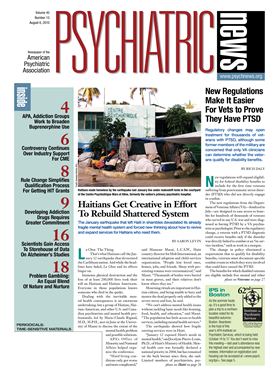The mental health advocacy group Mental Health America upped the ante at its annual conference in Washington, D.C., in June by focusing not just on recovery from mental illness, but on social inclusion for those who are recovering.
Looking out at the crowd attending the conference, Ken Thompson, M.D., associate director of medical affairs at the Center for Mental Health Services, which is part of the Substance Abuse and Mental Health Services Administration, said, “I am pleased to be in a room full of mental health advocates, since mental health advocacy is one of my passions.”
He suggested that after years of there being a heavy emphasis on the biology and genetics of mental illness, it was time to focus more on the “human ecology” aspects of mental illness—race, ethnicity, life events, families, neighborhoods, social support—to foster recovery. The recovery movement aims to help people with mental illness heal and grow. It is about moving people's life in the direction they want it to go in spite of their illness, he noted.
If people with mental illness are to recover, social inclusion is important, he emphasized. “We have to go beyond the concept of antistigma to help people with mental illness find work and participate civilly in society. What makes people healthy is the opportunity to take advantage of opportunities.”
He emphasized to his audience that their work as mental health advocates “is about making changes” in such domains. He urged them to get people outside of the mental health arena to help them bring about these changes. Once mental health advocates decide to work to bring about a change, chances are good that they will do so, he said.
Other conference speakers offered suggestions on how to achieve the social inclusion of people as they recover from mental illness.
For instance, evidence-based therapies for mental illness need to be expanded to include some “indigenous” evidence-based therapies that are rooted in family and social dynamics, Spero Manson, Ph.D., maintained. Manson, a Chippewa Indian, is a professor of psychiatry, and founder and director of the American Indian and Alaska Native Programs at the University of Colorado at Denver.
During the 1990s, Manson and his colleagues found that American-Indian and Alaska-Native military veterans who participated in tribal healing rituals were less likely to experience posttraumatic stress disorder than those who did not take part. As a result of these findings and of Manson's advocacy efforts, the Veterans Administration agreed in 1998 to compensate American-Indian and Alaska-Native tribes for performing these healing ceremonies for their members who are combat veterans.
Terrie Williams, an African American who founded the Terrie Williams Agency to represent personalities in entertainment, sports, business, and politics, also advocates for people who have mental illness. Social inclusion may be as simple as smiling at and saying hello to such individuals, she reminded her audience.
And as a mental health advocate in the audience aptly noted: “Social inclusion of people with mental illness is a journey, not a destination.”

